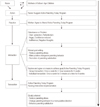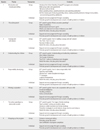Abstract
Purpose
The purpose of this study was to verify effects of the Active Parenting Today (APT) program based on King's Goal Attainment Theory on parenting stress, parenting behavior, and parenting satisfaction in mothers of school-age children.
Methods
This was a quasi-experimental study with a non-equivalent control group pre-post test design. Participants were 39 mothers of school-age children (19 in the experiment group and 20 in the control group) who were registered at two community children centers in G city. The experimental group received the APT program (2 hours/session/week) and telephone counseling (2 times/week) for 8 weeks. Data were analyzed using χ2-test, t-test, Fisher exact probability test, and ANCOVA with the SPSS/Win15.0 program.
Results
Parenting stress was significantly lower in the experimental group than in the control group. Positive parenting behavior and parenting satisfaction were significantly higher in the experimental group than in the control group. However, negative parenting behavior was not significantly different between the two groups.
Figures and Tables
References
1. Abidin RR. Parenting stress index (PSI) professional manual. 1995. 3rd ed. Odessa, FL: Psychological Assessment Resources, Inc.
2. Bang KS. Effects of an early nursing intervention program for infants' development and mother's child rearing in poverty. J Korean Acad Nurs. 2009. 39(6):796–804. http://dx.doi.org/10.4040/jkan.2009.39.6.796.
3. Crnic KA, Greenberg MT. Minor parenting stresses with young children. Child Dev. 1990. 61:1628–1637.
4. Chung KM, Lee KS, Park JA. Korean parenting stress index. 2008. Seoul: Hakjisa.
5. Cohen J. Statistical power analysis for the behavioral sciences. 1988. 2nd ed. New Jersey: Lawrence Erlbaum Associates.
6. Do SW. A study on role awareness and role performance among parents for early children with intellectual disabilities. J Intellect Disabil. 2010. 12(1):51–69.
7. Frey MA, Rooke L, Sieloff C, Messmer PR, Kameoka T. King's framework and theory in Japan, Sweden, and the United States. Image J Nurs Sch. 1995. 27(2):127–130.
8. Hong KJ, Noh AY, Cha YH, Choi TS. Active parenting now: Parent's guide. 2007. Seoul: Hakjisa.
9. Hong KJ. Active parenting today, parent's guide. 1995. Seoul: ChungAng Aptitude Publishing Co.
10. Hyun OK, Cho BH. Development of the parent-satisfactionscale. J Korean Home Econ Assoc. 1994. 32(1):103–117.
11. Jang SA, Yu YO. The effects of active parenting programs on mother's parenting efficacy and rearing stress. J Child Educ. 2008. 17(3):187–202.
12. Kim HM, Doh HS. Maternal parenting stress, efficacy, and behavior: Relations to children's social competence. Korean J Child Stud. 2004. 25(6):279–298.
13. Kim MR, Oh MJ, Oh IS, Hur SJ. The effects of the active parenting today on the self encouragement-discouragement and the parenting stress of mothers of children with disabilities. Korean J Couns. 2008. 9(4):1665–1683.
14. Kim WO, Kang HS, Cho KJ, Song YA, Ji ES. Comparative study on parenting stress, guilt, parenting attitude, and parenting satisfaction between mothers with a hemophilic child and a healthy child. Korean J Women Health Nurs. 2008. 14(4):270–277. http://dx.doi.org/10.4069/kjwhn.2008.14.4.270.
15. Kim YH, Kwon BS, Nam HG, Ahn MS, Yang YO, Oh SE, et al. Pediatric nursing. 2010. Seoul: Hyunmoonsa.
16. King IM. A theory for nursing: Systems, concepts, process. 1981. Albany, NY: Delmar.
17. Kong GS, Seo IH. A study on the case management practices in community children's centers. Korean J Fam Welf. 2009. 14(4):155–178.
18. Lee HR, Ryoo HJ, Kim JH. The effects of active education training program on parent's child-rearing attitude and communication. Korean J Couns. 2007. 8(2):533–547.
19. Lee MJ. (A) Study on the behavioral inhibition of 3-year-old girls and its related variables. 1998. Seoul: Ewha Womans University;Unpublished doctoral dissertation.
20. Lee YE. An experimental study on the impact of an agreement on the means to achieve nursing goals in the early postpartum period of primiparous mothers and enhance their self-confidence and satisfaction in maternal role performance. J Nurs Acad Soc. 1992. 22(1):81–115.
21. Lim CH, Lee SH, Lee KR. The effect of children's satisfaction with service provided by community child center on children's mental health-Focused on elementary students attending community child center. J Fam Relat. 2010. 15(1):71–98.
22. Lim HS. Child's sex, temperament, mother's emotion regulation, and parenting as related to child's emotion regulation. 2001. Seoul: Ewha Womans University;Unpublished doctoral dissertation.
23. Min HK. The effect of parent education program for the problem behavior of ADHD children, mother's child-bearing attitude, parenting stress, and mental health. 2008. Cheonan: Dankook University;Unpublished master's thesis.
24. Norris DM, Hoyer PJ. Dynamism practice: Parenting within King's framework. Nurs Sci Q. 1993. 6(2):79–85. http://dx.doi.org/10.1177/089431849300600207.
25. Oh J. The development of a program promoting the adjustment and its effectiveness for school aged children's hospital life. J Korean Acad Nurs. 2004. 34(3):525–533.
26. Park SY, Lee S. A preliminary study for the standardization of the Korean maternal behavior inventory. J Korean Home Econ Assoc. 1990. 28(1):141–156.
27. Popkin MH. Active parenting leader's guide. 1983. Atlanta: Active Parenting, Inc.
28. Shin IS, Cho OK. The effects of active parenting today to mothers' nurturing attitudes and verbal control patterns of mothers and the child's perceptions of their mother' childrearing behaviors. J Community Couns. 2002. 1(1):145–166.




 PDF
PDF ePub
ePub Citation
Citation Print
Print







 XML Download
XML Download